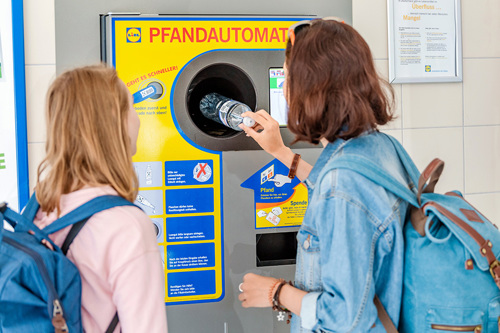Suntory Beverage & Food GB&I (SBF GB&I) has commissioned a new whitepaper study on Deposit Return Schemes called Deposit Return Schemes: What’s in Store? The major research into consumer behaviours and attitudes found that it takes just seven weeks for most shoppers to rethink their relationship with plastic bottles (88%) and to appreciate their value after living with the scheme.
As part of Deposit Return Schemes: What’s in Store? SBF GB&I undertook four distinct behavioural studies involving almost 8,000 people across the UK. The research included placing over 5,500 people in a virtual reality shopping environment to see how they would react when a theoretical deposit return scheme was introduced. Further studies with another group was focused on understanding how consumers lived with deposit return schemes over an 8-week period.

We discovered that shoppers experience a three-stage mental shift when required to pay a deposit, which we have categorised as Surprise, Review and Reset.Surprise: Shoppers experience surprise at being asked to pay more for soft drinks in a retail environment and return items for a fee, which is currently set at 20p per item in Scotland (with other devolved nations expected to introduce a similar level of fee).Review: In the second stage, consumers review their relationship with materials like plastic bottles and learn how to adjust to the new scheme rules after having to re-evaluate the value of their drinks packaging.Reset: And in the final phase, shoppers reset and change their behaviour towards materials like plastic bottles resulting in new routines and different choices.
Deposit Return Schemes: What’s in Store? can be downloaded here.
As one of the market leading branded soft drinks companies we are passionately committed to deposit return schemes to ensure that the right conditions exist for a truly circular economy so that our bottles and cans are used again and again. These systems work brilliantly abroad. We need them to be as simple and similar as possible across the UK to avoid complexity and confusion for retailers and shoppers, so they have every chance of succeeding.
Deposit return schemes will bring about one of the biggest changes in shopper behaviour in a generation. Many people purchase on autopilot and will be surprised that they will have to pay more up front and then retain the items in good condition to get their deposit back. Lots of retailers selling any bottle or can in the schemes will have to offer a collection service. This will positively transform the shopper relationship with plastic and cans. However, it’s important retailers understand this shift so they are in the best place to adapt to these forthcoming changes. We’re on hand to help them on this journey.
As part of our ‘Growing for Good’ vision, we are designing our products for circularity by making sure that 100% of our packaging is recyclable by 2025 and using more sustainable materials like rPET. Deposit return schemes will ensure that these materials are reused more effectively and for their intended purpose.
Notes to EditorWhite paper commissioned by Suntory Beverage & Food GB&I and undertaken by shopper insights agency Shoppercentric Ltd between May 2021 – December 2021.
Research Methodology:This research engaged a total of almost 8,000 people and had four elements:First Response: The first pulled together a small community of 25 people over a two-week period to look at how consumers reacted to a deposit return scheme. The community comprised of 13 women and 12 men, spread across the UK and Ireland, and split to ensure there was a mix of people aged 18-70, with and without children, from rural and urban locations and with varying buying habits.In-store Behaviours: The second used virtual reality technology to analyse how people shopped the soft drinks category with the addition of a 20p charge on drinks. 5,534 people were tracked as part of this research segment.Household Habits: A community of 104 people were brought together to form a qualitative “Mini Public” study in a deposit return scheme (DRS) ‘world’. The eight-week long project combined the learnings from the shopper behaviour with consumption and household habits and introduced socialising with DRS ‘rules’ in place. This fed into, and refined, an overall model to help predict consumer and shopper behaviour over time.Product Preferences: A study of 2,267 people to look at whether there were preferences for different types of packaging and products.